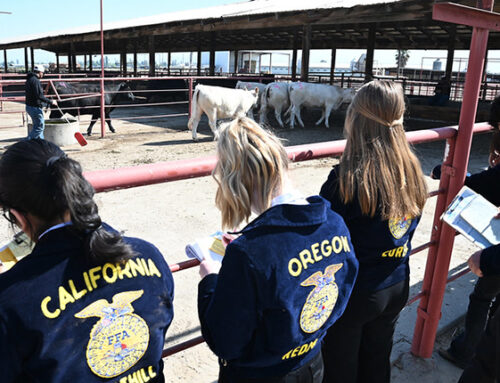Research into some of the key factors affecting the quality of life in the central San Joaquin Valley will be reported during a half-day symposium beginning at 9 a.m. Wednesday, April 26, in the Residence Dining Facility at California State University, Fresno.
The research underscores some of the region’s biggest challenges:
• Immigration. Dr. Xuanning Fu, an associate sociology professor, found that immigrants who live in the Valley “are significantly less likely to hold a professional or managerial job than those who live elsewhere in the state or the nation, thus adding to the brain drain the Valley is facing.” Fu will report on his data at 9:45.
• Housing crisis. Research conducted by Dr. Matthew A. Jendian, an associate professor of sociology, will provide details on the Fresno area’s housing crisis. His report is at 10:10.
• Unhealthy children. Dr. Virginia Rondero Hernandez, associate director of the Central California Children’s Institute at Fresno State and an assistant social work professor, will report at 10:50 on research showing disparities in the health of Valley youngsters.
• Deteriorating health. Research shows that “for key indicators, health is worse in the region than the state or the nation and there is little evidence of progress in recent years,” according to Dr. John A. Capitman, executive director of the Fresno State-based Central Valley Health Policy Institute and professor of public health, who speaks at 11:15.
Dr. Ed Nelson, a professor of sociology and director of the Fresno State-based Social Research Laboratory, begins the program at 9:20 a.m. with a look at data on a number of quality-of-life issues in the region. Among his findings is that while residents have decreasing or already-low confidence in different levels of government, they aren’t “necessarily dissatisfied with their lives or where they live.”
Carol Whiteside, president of the Great Valley Center, will deliver the keynote address at 12:20 p.m. underscoring the importance of academic research in the region.
The symposium is sponsored by the College of Social Sciences’ Department of Sociology and the Social Research Laboratory in collaboration with the university-based Central California Social Welfare, Research, Training and Evaluation Center.
Additional details are available by contacting the Department of Sociology at 559.278.2234 or Dr. Robert Palacio, department chair, via e-mail at robed palaciojcsufresno.edu.
Following are abstracts of Wednesday’s presentations:
“Quality of Life in the Central San Joaquin Valley; 2001 to 2005” by Edward Nelson, PhD., professor, Department of Sociology, and director of the Social Research Laboratory. Presentation at 9:20 a.m.:
“Our focus has been on issues such as financial satisfaction and expectations, performance of government, confidence in leadership, crime, the public schools and satisfaction with community and neighborhood. Confidence in the federal and local governments to solve problems at their level has been decreasing since 2001, while confidence in the state government has been consistently low. This does not mean that respondents are necessarily dissatisfied with their lives or where they live. In fact, satisfaction with one’s community and neighborhood remain at high levels. The Social Research Lab is conducting the 2006 quality of life survey and will update the results of previous surveys in the fall.’
“Immigration and the California Central Valley” by Xuanning Fu., PhD., associate professor, Department of Sociology. Presentation at 9:45 a.m.:
“California’s Central Valley is the agricultural base of the state, but has lower per capital income, lower average educational attainment and higher poverty levels than other regions. The Valley has in the recent decade experienced a loss of highly educated individuals to other parts of the state while gaining populations that are less educated and lower skilled, due to selective internal migration. This study examines the same issue, but focuses on the impact of international immigration. … Immigrants living in the Valley are significantly less likely to hold a professional or managerial job than those who live elsewhere in the state or the nation, thus adding to the brain drain the Valley is facing.”
“Raising Voices and Visions out of Fresno’s Housing Crisis and Organizing to Improve our Community” by Matthew Jendian, PhD.; director, American Humanics Program, and associate professor, Department of Sociology. Presentation at 10:10 a.m.:
“Data will be presented regarding Fresno’s housing crisis supplemented with individuals’ stories of their housing conditions. The origins of the Fresno Housing Alliance, a coalition of community members committed to increase the availability of safe, decent, accessible affordable housing in Fresno, will be discussed, along with some of the principles used in organizing for change. Some the obstacles to making housing affordable to our residents also will be discussed, as will some key elements of the strategy developed by the alliance to address this issue.”
“Methodologies for Studying Health Disparities Among Children in Central California” by Virginia Rondero Hernandez, PhD.; associate director, Central California Children’s Institute, and assistant professor, Department of Social Work Education. Presentation at 10:50 a.m.:
“This presentation will describe the research objectives, analysis strategies and outcomes produced by multidisciplinary faculty research teams working in partnership with the Central California Children’s Institute at
“Key Health and Healthcare Challenges for the San Joaquin Valley” by John A. Capitman, PhD.; executive director, Central Valley Health Policy Institute, and professor of public health, College of Health and Human Services. Presentation at 11:15 a.m.:
“National Healthy People 2010 objectives can be used to rate health and healthcare quality in the region in comparison to the rest of California and the nation. These comparisons show that for key indicators, health is worse in the region than the state or the nation and there is little evidence of progress in recent years. These data also underscore the extent of racial/ethnic and insurance status disparities in health, while additional measures underscore specific areas for healthcare improvements. The Central Valley Health Policy Institute is collaborating with multiple organizations around the region to address some of these issues.”
EDITORS and NEWS/PUBLIC AFFAIRS DIRECTORS: Press releases can be downloaded at www.fresnostatenews.com. University Communications also provides releases for news media companies via e-mail. To be added to the distribution list, send your e-mail address to tomu@csufresno.edu.



